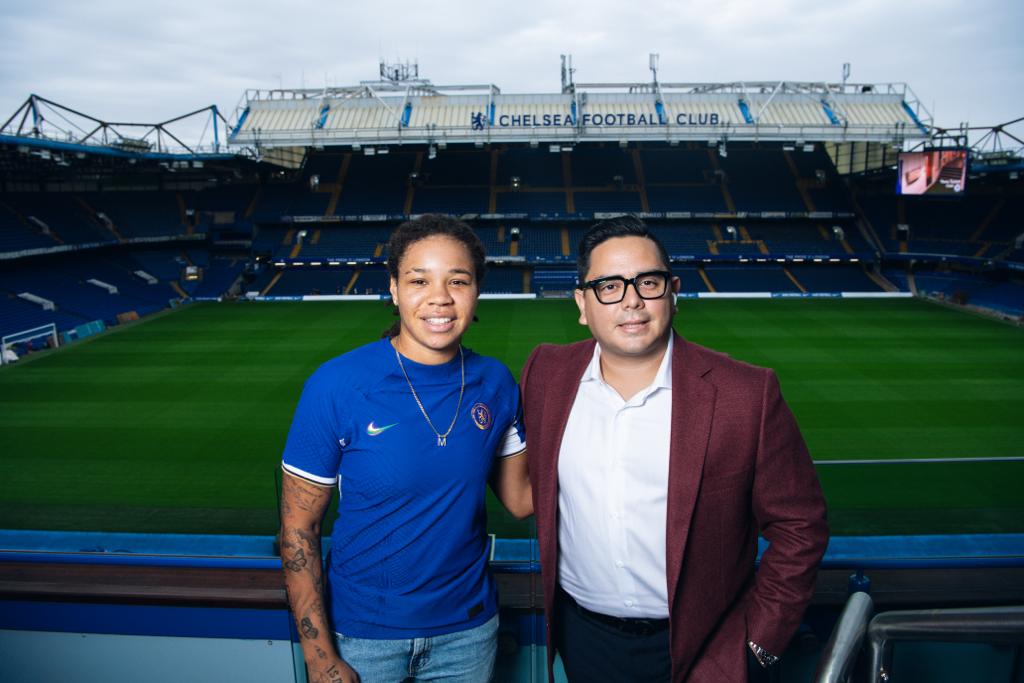This article is part of Bísness School, a series that highlights one of the fastest-growing groups of entrepreneurs in the United States, Latinos. You can hear or watch the full conversation with Rafa Nieves below.
Rafa Nieves was 16 years old when he signed his first professional contract with the Detroit Tigers.
"All I wanted was to play baseball," Nieves said. "I was just excited. This was a dream come true. Yeah, there's some money involved, but, you know, coming from Venezuela, a third world country, at 16 years old, like, any sum of money is life-changing money. The signing bonus was around $100,000."
Nieves went from being one of the best players in his home country to the "bottom of the barrel," he says.
"The main goal is to make it to the major leagues, which only a very small percentage of players that even sign and make it to the pros make it to the big leagues." Nieves said. "You just have to buckle up and find that consistency and that dedication. You have to stay motivated to work hard every day and try to stay healthy. Make sure that, you know, you put in the work."

Bísness School
Latino entrepreneurs explain how they started their businesses and what they've learned along the way.
Nieves spent the next few years playing for the Detroit Tigers organization until 19, when a lower back injury sidelined his baseball career and the unexpected death of his father flipped his world upside down.
"I totally lost focus on my priorities, lost focus on on my goals," said Nieves. "It was a perfect storm. I lost the motivation, the focus, everything. And then I got hurt, and then the team released me."
Feeling out of the loop? We'll catch you up on the Chicago news you need to know. Sign up for the weekly> Chicago Catch-Up newsletter.
Nieves went on to sign with the New York Yankees organization, but his game continued to suffer. "I was playing hurt," he said. "I didn't do really well. And everything like, I don't know, I kind of, like, baseball became a second thought. I was in a dark place. Losing my dad was heartbreaking for me."

Nieves spoke to NBC's Bísness School about how he turned that grief into a successful nightlife career before pivoting to the sports agency world. The answers have been edited for length and clarity.
Bísness School: You decide to close the door on your baseball career chapter around 2002, and you have to make money somehow. So what do you do next to make a living?
Rafa Nieves: I remember, things in Venezuela were getting socially, economically and politically a little [challenging]. I decided to go to South Florida. I had friends that were going to University of Miami and Florida International University. I had a community there, so I wouldn't be alone. And then eventually I had a cousin of mine who lived in Miami Beach, and her husband was a manager at the Loews Hotel, a luxury hotel on Collins Avenue. And she helped me get a job through him, as a front desk agent, just to pay the bills. And that led to me learning the hospitality industry. I went from working the front desk to also helping the concierge desk. And I realized that's where the money was.
BS: You start building relationships with restaurants, lounges and nightclubs. When VIP guests come and ask for recommendations, you tell them where to go and earn a commission off that?
RN: Nobody was doing this in South Beach, so we did. Within two weeks we had a crazy amount of VIP bottle service tables that we were selling at these clubs. And eventually that led to working full-time at the nightclubs.

BS: One day in 2011, you're in your living room in Miami, watching the MTV Video Music Awards. And you have an "aha" moment. Can you explain what you saw on TV?
RN: I met my wife in 2009. We were dating for two years. She lived here in California, and I lived in Florida. I knew that I wanted to marry her, and I was getting ready to propose. And if we got married, I'd have to leave Miami. I'd have to move to California, because she had a daughter. So I'm thinking, well, you know, what am I going to do career-wise if I move to Los Angeles? All these relationships and all this network that I built here in Miami is useless if I move somewhere else. And also, I remember a lot of people in my nightlife told me, like, if you're going to get married, you need to get out of this industry. I remember the night of the VMAs, I was sitting on the couch with my girlfriend, now wife, and we were watching the VMAs. I remember vividly: I was watching Usher perform. And I said, well, I have two sets of skills. I have a background in baseball, what I'd done my whole life, even though I don't, you know, use it anymore. But now I have a background also in hospitality, which is customer service and babysitting VIPs at the nightclub. And then it was like a light bulb went on in my head. What I do in nightlife is similar to what agents do, helping manage high-net-worth, high-maintenance people.
Watch the full conversation with Rafa Nieves to learn how he went from professional baseball player to professional agent, what he wrote in the cold email that got him his first job and how he landed at one of the most respected sports agencies.



